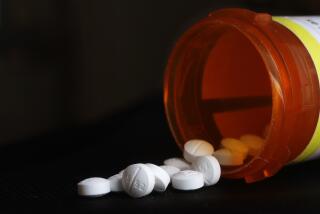Doctors Should Set Example Against Drug Use
- Share via
I am tired of reading about drugs and drug abuse--not because there isn’t a problem, but because there isn’t any solution. This is America. We’re supposed to be able to do anything!
I do detect a slight shift in attitude against drugs. The drug-using professional is no longer considered “totally cool,” but that is not enough. I don’t want to hear that it will be another 10 or 20 years before the problem is under control. I don’t want to read that drugs have always been a part of our society and that we have reached another peak of drug usage, and now we are on the decline. Because if we believe that, then in the near future, the problem will again resurface and destroy more families.
Why am I writing a column at this particular time? Well, I recently read the New England Journal of Medicine report on drug usage among physicians and medical students.
I thought we belonged to a noble profession. I thought I/we were better. I don’t want to hear that “our rate of drug usage is no higher than that of other professionals” or that the rate of recreational drug use among physicians has increased, but “in keeping with the rate of increase in the general population.” We are not the general population. We are supposed to know better. We’re supposed to be aware of the harm that any drug or medication can cause and use them only to prevent or cure illness.
Are our lives so stressful, so meaningless, so boring, so stimulating, or so whatever that we need to alter our consciousness to change our reality? Why did 33% of physicians and 44% of medical students feel the need to use psychoactive drugs during the past year (not even including alcohol or tobacco)? Why do 9.5% of physicians and 16.1% of medical students take drugs on a regular basis (once a month or more).
I’m concerned about the impairment that drugs can cause in my accountant or lawyer, but if they make a mistake I only lose money. I certainly don’t want to worry about whether my doctor is “under the influence.” If he makes a mistake, it can cost me more than money. If close to 50% of medical students today see no harm in using psychoactive drugs, how are they, as future physicians, going to play a significant role in drug abuse prevention? How convincing can a physician who smokes cigarettes be when discussing the harmful effects of smoking with his patients? How can a physician counsel a teen-ager about drug abuse when he cannot even recognize it in himself?
My wife has always said that physicians are poor role models when it comes to health (at the majority of dinner meetings for physicians, the main course is still beef, rather than chicken or fish). Physicians do smoke less than the general population. But how can even one physician smoke with all the medical evidence available?
On the one hand, if the effect from a drug is not as expected, you have taken an unnecessary significant risk, a risk of death from the drug itself or possibly an accident, or at the least a risk of damaging your reputation.
On the other hand, if the drug has had the effect that one expected, then there is even a more difficult potential problem. The lure of obtaining the same feeling will cause one to again attempt to use that particular drug, or another, in the future, with the real risk of addiction. In both situations you lose. Only a very desperate individual or a fool would be tempted by such a no-win situation.
People will probably say that I have an idealistic, naive view of my profession. Maybe I do, but I still think most people would wish it to be so.
If we, who have the most knowledge, the privilege to serve mankind, and all the economic benefits of our society cannot resist the lure of drugs, how can we expect the less fortunate to do so? It seems that Pogo was right: “We have met the enemy, and they are us.”





